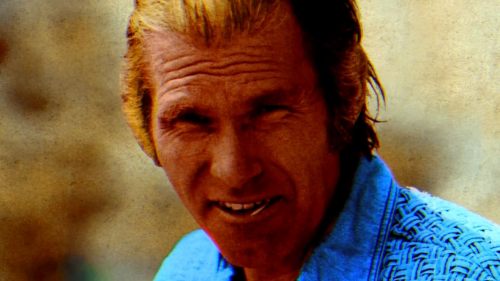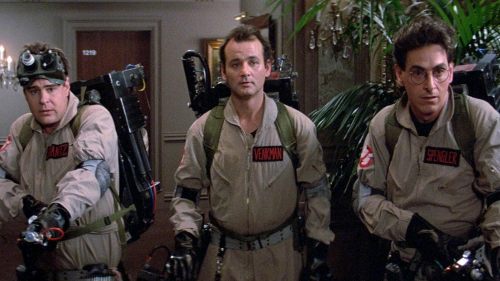Collins’ Crypt: How A PJ Soles Double Feature Inadvertently Bummed Me Out
As I mentioned in my post about the Carrie event (which was AWESOME - they turned the house lights red when Carrie began her attack! So friggin cool), Los Angeles is certainly not starved for horror-themed activities to do during this Halloween "season", and so you have to pick your battles and Sophie's Choice a lot of things because there's no way to do them all. Case in point, by going to the Carrie event, I had to miss a chance to see both Dr Phibes movies (the original on 35mm no less) at the Aero theater, as well as Darren Bousman doing a Q&A for Saw IV at the New Beverly (granted, not the best, or even HIS best Saw film by any means, but he's got fun stories to tell about the production). And if it ran late, I'd be missing the most important event of all: the original Halloween at the Nuart, which was scheduled for midnight across town from Carrie. I had to walk out of Carpenter's classic (and my all time favorite) film last year, as Fathom Events botched their presentation badly even by their low standards (wrong aspect ratio, too dark to see anything, pixelated...), but since they weren't involved this time, and the Nuart knows what they're doing, I had high hopes it would meet my picky standards.
Luckily, Carrie ran smoothly and on schedule, giving me plenty of time to get from Downtown LA to Santa Monica - I even got there early enough to grab a (pumpkin!) shake from the '50s Cafe down the street from the Nuart. But despite that extra time, and the fact that I've watched both movies over and over (Halloween more than Carrie, of course), it wasn't until Halloween's credits came up that it dawned on me how my schedule worked out: I was seeing a PJ Soles double feature! Ms. Soles did not do a lot of horror movies after these two classics, probably for fear of type-casting but possibly because she knew she had already pretty much peaked in that genre and thus should look elsewhere instead of suffering diminishing returns (in recent years she's appeared in several indie horror films, usually in cameo appearances), so odds are slim even in this busy season that you'd get to see her twice on the big screen in one night. But it wasn't long after that that I realized she wasn't the only thing making this a "perfect" double feature - both films got me thinking a lot about how much the world has and hasn't changed since, and sadly not for the better.
Now, obviously with Carrie being forty years old (old enough to have been remade twice!) and Halloween right on its heels, both films are "dated" in a very technical sense - the hairstyles, the clothing, the pricing (a character bemoans the ten dollar rental charge for a tuxedo in Carrie), etc. And neither film's script could be reshot as is today - cell phones and modern transportation options would kill Michael Myers' plans for the babysitters if they had access to them (Paul could Uber over to Annie, so Myers would just be sitting in her car all night), and everyone is too security-conscious to allow any of the prom shenanigans to go down as easily as Chris and Billy commit them here. There is no such thing as a "timeless" movie if you're going to qualify such things, which is a main reason you shouldn't - a movie is only "dated" if it relies on things that were popular at the time (see, or don't, any Friedberg & Seltzer parody film). And believe me, neither of these films are dated in that sense - they're just as relevant now as they were when first released.

Carrie's modern-day significance is easier to spot, because sadly, forty years later, kids can still be truly awful people, and sometimes the victims of their torment strike back. It may be a shooting (Columbine is a frequent example, albeit an erroneous one), but too often it's a suicide - and the victims keep getting younger. Just last week I read about a 13-year-old who hung himself after being bullied, and I found examples of even younger children, going as far back as 9 years old before getting too depressed to risk looking for anyone younger. None of them, of course, had telekinetic powers to strike back - in the real world, Carrie White does not get to take her revenge after being humiliated. No, in reality, Carrie would go home and kill herself, and after a day of pretend mourning at her school, things would go back to normal. It happens so often that, like shootings, it's hard to keep the details straight; indeed, today when I was Googling the age of that boy I read about last week using the only details I remembered, I found two other similar cases before finding the exact one! It was something I found upsetting enough before I had my own kid - now I'm just completely devastated by these stories, and I honestly don't know if I'd rather he turned out to be a bully or be bullied. It seems either scenario would wreck me, and hopefully I don't have to worry about it as my dad likely did.
As I've mentioned in the past, I got picked on as a kid. Not to the extent that would ever be interesting to anyone, but enough that it bummed me out and resulted in me occasionally taking different routes back to my house from the bus stop or whatever. I'm not sure what caused me to be their target, but I know it started in first grade, before I got to watch horror movies on the regular (that would be 2nd and 3rd grade), so it wasn't that I was the "weird kid" (nor did I dress differently - it was Catholic school so we all wore the same goddamn thing). All I know is, a couple of hurt feelings and lingering self-conscious thoughts about the shape of my head was nothing compared to the fictional torment of Carrie or the very real torment for kids like that 9 year old, Jackson, who ended up taking his life inside a clubhouse he had built in hopes of making new friends. Watching Carrie take revenge on the bigger assholes of the lot (namely Chris and Billy) had me wondering if kids like Jackson had access to this movie (or even the remakes), whether that could be cathartic for them in some way - or if it would just give them the idea to grab a gun to make up for their lack of superpowers. I'd like to think the former - after all, Carrie doesn't get to ride off into the sunset at the end; her powers end her life as well, so ideally they'd get that bit of thrill from seeing the bullies get their comeuppance, and then realize that taking ANY kind of drastic measure wasn't the best idea.
Either way, it's sad that this element wasn't one of the "dated" things about the movie. Much like seeing people smoke indoors or seeing the hero of a movie casually say things like "fag" when discussing a gay person, it would have been wonderful to have to tell a younger viewer that back in 1976, bullies could get away with such behavior. Or even have to explain the concept of bullying at all. Stricter school laws for bullies (so many of those suicide cases involve teachers/principals who were aware of the issue and didn't do anything to help) might not be enough, but it'd be a big help in turning the tide. We're currently seeing some positive results when it comes to people speaking up after years of being silenced, so the kids who are brave enough to "tattle" on their tormentors should be supported 100% and be assured in a timely manner that their courage was being rewarded with appropriate consequences. It would have been nice to laugh at the bullying scenes in that same uncomfortable way we laugh at casual racism or homophobia in older films - not that it's funny in the traditional sense, but more in the "I can't believe this used to happen!" way. Ideally, the Carrie remake from 2013 (hell, even the 2002 one) would have been possible only as a period piece due to the unlikelihood of somone suffering that kind of ridicule without instant consequences (and not by wearing them out with exercise; my friend pointed out that Ms. Collins' detention "punishment" was akin to the cross-fit people *pay* to endure now). Perhaps by the time the film celebrates its 50th anniversary, we can laugh at how "dated" the concept of bullying is.

Halloween, on the other hand, made me wish we could actually go back in time, not look forward to a better future. After the movie, I knew as soon as I looked on Twitter I'd be confronted with yet another round of "Look at the horrible thing Trump did now" stories that would in no way impact his candidacy for President. In the past few days, he's just gotten worse - now he's up to encouraging civil war should he lose the election (which he will, because it's "rigged", you see - not because he's a cartoon monster), and I truly worry about what will happen after the election: it seems even if (WHEN) he loses there will be some cause for panic. So I couldn't help but wish I could go back to the magical world of Haddonfield, Illinois in 1978, where 2nd graders walked several miles (Tommy sees Laurie on the way to school - later she is driven to his house and it takes quite a while) and the only thing of any concern was whether or not Ben Tramer would take Laurie to the dance (spoiler: he doesn't.)
John Carpenter would make some overtly anti-establishment movies in his career (including Escape From New York just three years later), but Halloween is thankfully free of any such agenda - it's so stripped of real world intrusions that it's almost jarring to hear a familiar song like "Don't Fear the Reaper" on the radio. Haddonfield exists in a sort of Norman Rockwell-ian state, where Annie would know the age of old Mr. Riddle down the street and (in the sequel) a teenaged girl would be concerned about the elderly couple who lived next door, a far cry from today where most folks (myself included) couldn't pick their neighbors out of a lineup. It's a town where the cops will stop to help the kooky old psychiatrist, who has to produce a permit for the gun he carries around when it concerns the sheriff who will try to stop him from firing it a few hours later. We don't hear about too many escaped mental patients anymore thanks to higher security measures, but that doesn't mean Laurie and her friends would have nothing to worry about if they were real and alive in the world today, because the number of towns like Haddonfield, where people don't lock their doors, are becoming extinct.
So just as Carrie inspired some optimism of a bully-free world, Halloween balanced it out with a pessimistic feeling that future generations might not understand how Laurie, Annie, and Lynda (PJ Soles' character, of "totally" fame and for many a young male horror fan, probably the one that "got their ghost") can walk around without a care in the world, or why Laurie isn't afraid to leave two kids alone in the house so she can go three doors down in the dark and see what's up. Our world is filled with constant fears, real and imagined, thanks to the likes of Trump riling people up, and I worry it will get harder and harder to ever just RELAX anymore. 9/11 made crashing the least of our concerns when we fly, assholes like the one in Aurora give some of us pause when we enter a movie theater out of fear that we might be shot (and you can forget about schools)... a slowpoke like Michael Myers might find his victims already dead by the time he finishes stalking around them for a while. I've long thought that the reason slasher films are so hard to pull off nowadays is because of technology (the "no signal" thing wouldn't even fly in Haddonfield), but perhaps it's just because a lone guy with a knife isn't nearly as scary as the fact that we might get shot when we sit down to watch that kind of movie. Perhaps people flock to supernatural horror movies because they're easier to escape into - ghosts and demonic curses still have no commonplace real world equivalent, but change Jason's machete to an AK-47 and he's the guy you see on the news every other week. And even Jason never murdered children, as the Sandy Hook shooter did. Is "Well at least he's not as bad as (most recent school shooter)" really something we want to think about when watching a Halloween or Friday the 13th movie? Better to just play it safe and watch the Paranormal Activity ghost fuck around with a pool filter.

Maybe on a subconscious level that's why I wanted to take this picture of my son at the Myers house this weekend. We were in Pasadena (where the film was largely shot) for a fall fair, and even though I had already seen/taken pictures of the house and he would obviously have zero appreciation of what we were doing, I drove ten miles out of our way to grab that shot. Perhaps I want to raise him in a place like Haddonfield, where as long as the Smith's Groves of the world are watching their front doors, he won't have anything to worry about when he walks to school or watches old movies with a babysitter (and where there's a "Mackenzie house" to send him to should an emergency arise). A world where the President is just someone doing his/her job and not someone that's constantly blowing up our Twitter feeds by complaining about how they're being treated on Saturday Night Live. Where a guy's idea of causing trouble is to throw eggs and soap windows, not committing a hate crime or a sexual assault. For that, I'm thankful the house is still there to visit (albeit in a different spot), because it offers hope that such a world hasn't been lost forever. We'll always have our horror movies to watch - the question is whether or not they scare us because our lives are relatively perfect, or if we'd rather be at Carrie's prom or on the streets of Haddonfield on a Halloween night, figuring our chances there are better than they are in the real world outside.



